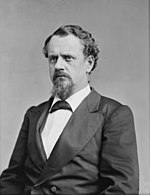John Y. Brown (politician, born 1835), Date of Birth, Place of Birth, Date of Death
TweetJohn Y. Brown (politician, born 1835)
19th-century American politician
 Date of Birth: 28-Jun-1835
Date of Birth: 28-Jun-1835
 Place of Birth: Claysville, Pennsylvania, United States
Place of Birth: Claysville, Pennsylvania, United States
Date of Death: 11-Jan-1904
Profession: lawyer, politician
Nationality: United States
Zodiac Sign: Cancer 
About John Y. Brown (politician, born 1835)
- John Young Brown (June 28, 1835 – January 11, 1904) was a politician from the U.S.
- Commonwealth of Kentucky.
- He represented the state in the United States House of Representatives and served as its 31st governor.
- Brown was elected to the House of Representatives for three non-consecutive terms, each of which was marred by controversy.
- He was first elected in 1859, despite his own protests that he was not yet twenty-five years old; the minimum age set by the Constitution for serving in the legislature.
- The voters of his district elected him anyway, but he was not allowed to take his seat until the Congress' second session, after he was of legal age to serve.
- After moving to Henderson, Kentucky, Brown was elected from that district in 1866.
- On this occasion, he was denied his seat because of alleged disloyalty to the Union during the Civil War.
- Voters in his district refused to elect another representative, and the seat remained vacant throughout the term to which Brown was elected.
- After an unsuccessful gubernatorial bid in 1871, Brown was again elected to the House in 1872 and served three consecutive terms.
- During his final term, he was officially censured for delivering a speech excoriating Massachusetts Representative Benjamin F.
- Butler.
- The censure was later expunged from the congressional record. After his service in the House, Brown took a break from politics, but re-entered the political arena as a candidate for governor of Kentucky in 1891.
- He secured the Democratic nomination in a four-way primary election, then convincingly won the general election over his Republican challenger, Andrew T.
- Wood.
- Brown's administration, and the state Democratic Party, were split between gold standard supporters (including Brown) and supporters of the free coinage of silver.
- Brown's was also the first administration to operate under the Kentucky Constitution of 1891, and most of the legislature's time was spent adapting the state's code of laws to the new constitution.
- Consequently, little of significance was accomplished during Brown's term. Brown hoped the legislature would elect him to the U.S.
- Senate following his term as governor.
- Having already alienated the free silver faction of his party, he backed "Goldbug" candidate Cassius M.
- Clay, Jr.
- for the Democratic nomination in the upcoming gubernatorial election.
- However, the deaths of two of Brown's children ended his interest in the gubernatorial race and his own senatorial ambitions.
- At the Democratic nominating convention of 1899, candidate William Goebel used questionable tactics to secure the gubernatorial nomination, and a disgruntled faction of the party held a separate nominating convention, choosing Brown to oppose Goebel in the general election.
- Goebel was eventually declared the winner of the election, but was assassinated.
- Brown became the legal counsel for former Kentucky Secretary of State Caleb Powers, an accused conspirator in the assassination.
- Brown died in Henderson on January 11, 1904.
Read more at Wikipedia
See Also
- Famous People's Birthdays on 28 June, United States
- Famous People's Birthdays in June, United States
- Famous lawyer's Birthdays on 28 June, United States
- Famous lawyer's Birthdays in June, United States
- Famous politician's Birthdays on 28 June, United States
- Famous politician's Birthdays in June, United States



